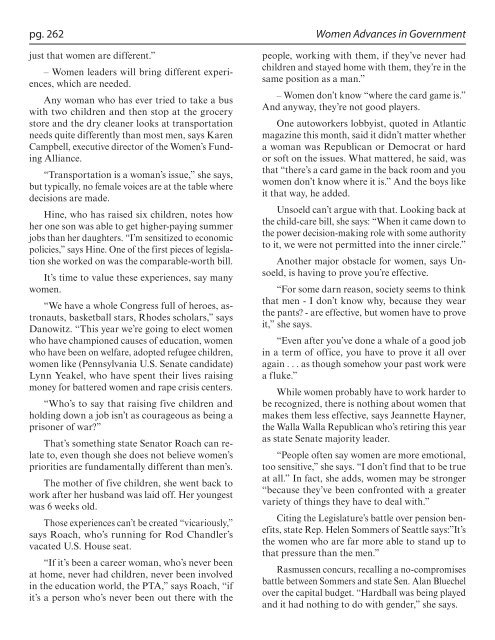Helen Sommers: An Oral History
Helen Sommers: An Oral History
Helen Sommers: An Oral History
You also want an ePaper? Increase the reach of your titles
YUMPU automatically turns print PDFs into web optimized ePapers that Google loves.
pg. 262 Women Advances in Government<br />
just that women are different.”<br />
– Women leaders will bring different experiences,<br />
which are needed.<br />
<strong>An</strong>y woman who has ever tried to take a bus<br />
with two children and then stop at the grocery<br />
store and the dry cleaner looks at transportation<br />
needs quite differently than most men, says Karen<br />
Campbell, executive director of the Women’s Funding<br />
Alliance.<br />
“Transportation is a woman’s issue,” she says,<br />
but typically, no female voices are at the table where<br />
decisions are made.<br />
Hine, who has raised six children, notes how<br />
her one son was able to get higher-paying summer<br />
jobs than her daughters. “I’m sensitized to economic<br />
policies,” says Hine. One of the first pieces of legislation<br />
she worked on was the comparable-worth bill.<br />
It’s time to value these experiences, say many<br />
women.<br />
“We have a whole Congress full of heroes, astronauts,<br />
basketball stars, Rhodes scholars,” says<br />
Danowitz. “This year we’re going to elect women<br />
who have championed causes of education, women<br />
who have been on welfare, adopted refugee children,<br />
women like (Pennsylvania U.S. Senate candidate)<br />
Lynn Yeakel, who have spent their lives raising<br />
money for battered women and rape crisis centers.<br />
“Who’s to say that raising five children and<br />
holding down a job isn’t as courageous as being a<br />
prisoner of war?”<br />
That’s something state Senator Roach can relate<br />
to, even though she does not believe women’s<br />
priorities are fundamentally different than men’s.<br />
The mother of five children, she went back to<br />
work after her husband was laid off. Her youngest<br />
was 6 weeks old.<br />
Those experiences can’t be created “vicariously,”<br />
says Roach, who’s running for Rod Chandler’s<br />
vacated U.S. House seat.<br />
“If it’s been a career woman, who’s never been<br />
at home, never had children, never been involved<br />
in the education world, the PTA,” says Roach, “if<br />
it’s a person who’s never been out there with the<br />
people, working with them, if they’ve never had<br />
children and stayed home with them, they’re in the<br />
same position as a man.”<br />
– Women don’t know “where the card game is.”<br />
<strong>An</strong>d anyway, they’re not good players.<br />
One autoworkers lobbyist, quoted in Atlantic<br />
magazine this month, said it didn’t matter whether<br />
a woman was Republican or Democrat or hard<br />
or soft on the issues. What mattered, he said, was<br />
that “there’s a card game in the back room and you<br />
women don’t know where it is.” <strong>An</strong>d the boys like<br />
it that way, he added.<br />
Unsoeld can’t argue with that. Looking back at<br />
the child-care bill, she says: “When it came down to<br />
the power decision-making role with some authority<br />
to it, we were not permitted into the inner circle.”<br />
<strong>An</strong>other major obstacle for women, says Unsoeld,<br />
is having to prove you’re effective.<br />
“For some darn reason, society seems to think<br />
that men - I don’t know why, because they wear<br />
the pants? - are effective, but women have to prove<br />
it,” she says.<br />
“Even after you’ve done a whale of a good job<br />
in a term of office, you have to prove it all over<br />
again . . . as though somehow your past work were<br />
a fluke.”<br />
While women probably have to work harder to<br />
be recognized, there is nothing about women that<br />
makes them less effective, says Jeannette Hayner,<br />
the Walla Walla Republican who’s retiring this year<br />
as state Senate majority leader.<br />
“People often say women are more emotional,<br />
too sensitive,” she says. “I don’t find that to be true<br />
at all.” In fact, she adds, women may be stronger<br />
“because they’ve been confronted with a greater<br />
variety of things they have to deal with.”<br />
Citing the Legislature’s battle over pension benefits,<br />
state Rep. <strong>Helen</strong> <strong>Sommers</strong> of Seattle says:”It’s<br />
the women who are far more able to stand up to<br />
that pressure than the men.”<br />
Rasmussen concurs, recalling a no-compromises<br />
battle between <strong>Sommers</strong> and state Sen. Alan Bluechel<br />
over the capital budget. “Hardball was being played<br />
and it had nothing to do with gender,” she says.
















